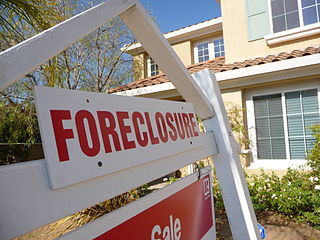– Dan Freund, Eau Claire bankruptcy lawyer
More bankruptcy questions? Check our our FAQ page.
 This page contains general information. Contact a WBG attorney for specific advice.
This page contains general information. Contact a WBG attorney for specific advice.
This article explains your foreclosure options. We have a separate article on how foreclosure works.
Most folks do everything they can to make their house payments. But illness, job loss, or some other hardship may strike. Then – before you know it – you’re behind the eight ball. Foreclosure looms. (Read more about the foreclosure process here.) What to do?
First, take a hard, cold look at the facts. Can you afford this home? You may want to consult with a local, non-profit budget counselor to help you decide.
IF YOU CAN’T AFFORD YOUR HOME
If you can’t afford the home then the next question is whether you have equity.
If you have equity. If you have equity and can’t afford the home then you should list the home for sale as soon as possible. This gives you the longest possible period of time to get the best sale price.
If you don’t have equity. Most Wisconsin foreclosures involve no deficiency judgment. And the foreclosure process takes many months (and often longer). So, as hard as this may be to believe, your best option may be to stop paying while continuing to live in the home – rent free – until the foreclosure runs its course.
If you want to avoid foreclosure you can offer your lender a “deed in lieu” of foreclosure. Or, to put it in simple English, you can offer to give the property back. Sometimes a lender won’t take the property back without a foreclosure. Once in a while a lender will actually pay to get the property back without the cost of doing a foreclosure.
A sale for less than the amount you owe – a “short sale” – offers another way to avoid foreclosure if your lender will agree. Real estate agents like short sales because they result in a commission. But, as explained in the next paragraph, short sales seldom do much good for the borrower.
As a general rule, neither a deed in lieu nor a short sale will result in a better credit rating than a foreclosure. And, unless the lender agrees in writing to waive the deficiency, neither a deed in lieu nor a short sale will protect you against a deficiency claim. Even if the lender does agree to waive a deficiency you may have taxable “cancellation of debt” income. Check with your accountant about that possibility.
IF YOU CAN AFFORD YOUR HOME
The first option to consider if you can afford the home is trying to make a lump sum catch up payment. Don’t have friends or relatives who will lend you the funds? Contact your lender and try to make payment arrangements.
If you can’t make a lump sum payment and your mortgage company won’t accept catch up payments then you may want to consider “mortgage modification.” Unfortunately, many lenders’ modification programs have proven to be bureaucratic nightmares. Better to work with a legitimate housing counselor. Avoid out of state “mortgage rescue” firms.
If your mortgage company won’t work with you then you can level the playing field with a Chapter 13 bankruptcy. In Chapter 13 you can force the lender to accept regular and catch up payments. Or you can propose to negotiate a modification of your loan with the help of a mediator.
Whether you have equity or not, whether you can afford your home or not, time is your enemy. You should select a course of action as soon as possible. Contact a Wisconsin Bankruptcy Guide attorney for more information regarding foreclosure in Wisconsin.
More bankruptcy questions? Check our our FAQ page.
This page contains general information. Contact a WBG attorney for specific advice.
Wisconsin Bankruptcy Guide is provided by law firms designated as Debt Relief Agencies by the federal government because we help people file for relief under the Bankruptcy Code. We also provide other types of debt relief options.
Image credit: flickr/Jeff Turner
